‘I realised my originality was my best asset. There’s only one Skin’
The Skunk Anansie star and recipient of Attitude's Icon Award, supported by Virgin Atlantic, has been refusing to play by the music industry's rules for more than 30 years.
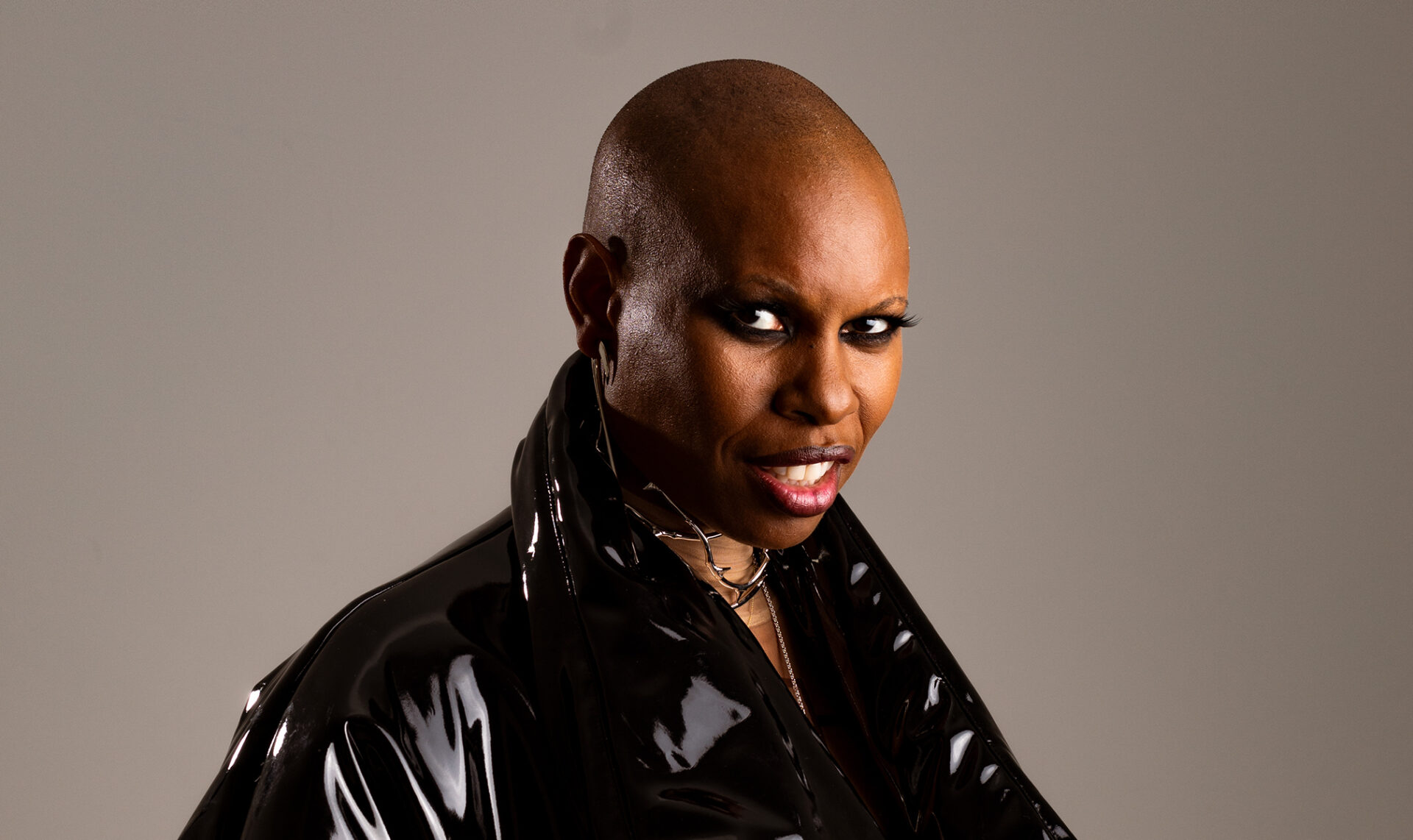
London is silent apart from elongated loops of sombre chapel bells chiming outside the window. It’s 5 am and many are only just waking up to a new dawn. Thundering drums are pounding poetically in my head after I witnessed the entire dress rehearsal for what will be one of the most attended funerals in history on my way home. Her Majesty has left the proverbial building. The queen is gone.
Inside my flat, my screen illuminates as a call comes in from across town. Flanked by DJ decks, a complex array of fancy studio kit, and wearing her trademark, thick-rimmed square glasses, and shaven head, Skin, the first Black lady of the Britrock movement, is very much alive.
With a 1979 photo of Grace Jones crawling across the roof of her New York apartment as her backdrop, Skin’s smile radiates enthusiasm as she waxes lyrical about the legions of Black bands and artists coming up on the rock scene as she talks about her new, 10-part feature The Skin Show on Absolute Radio. She finished presenting the first episode just hours before our call.
It’s hard to downplay being starstruck by Skin, winner of The Icon Award, supported by Virgin Atlantic. Over the past two decades, Skin has clocked up solo accolades that range from being awarded an OBE for services to music in 2021 and hosting her own podcast Skin Tings to becoming the first Chancellor at Leeds Arts University and being acclaimed by Sky Arts as one of the 50 most influential artists of the past half-century. Most recently, she also added ‘mother’ to her list of titles.
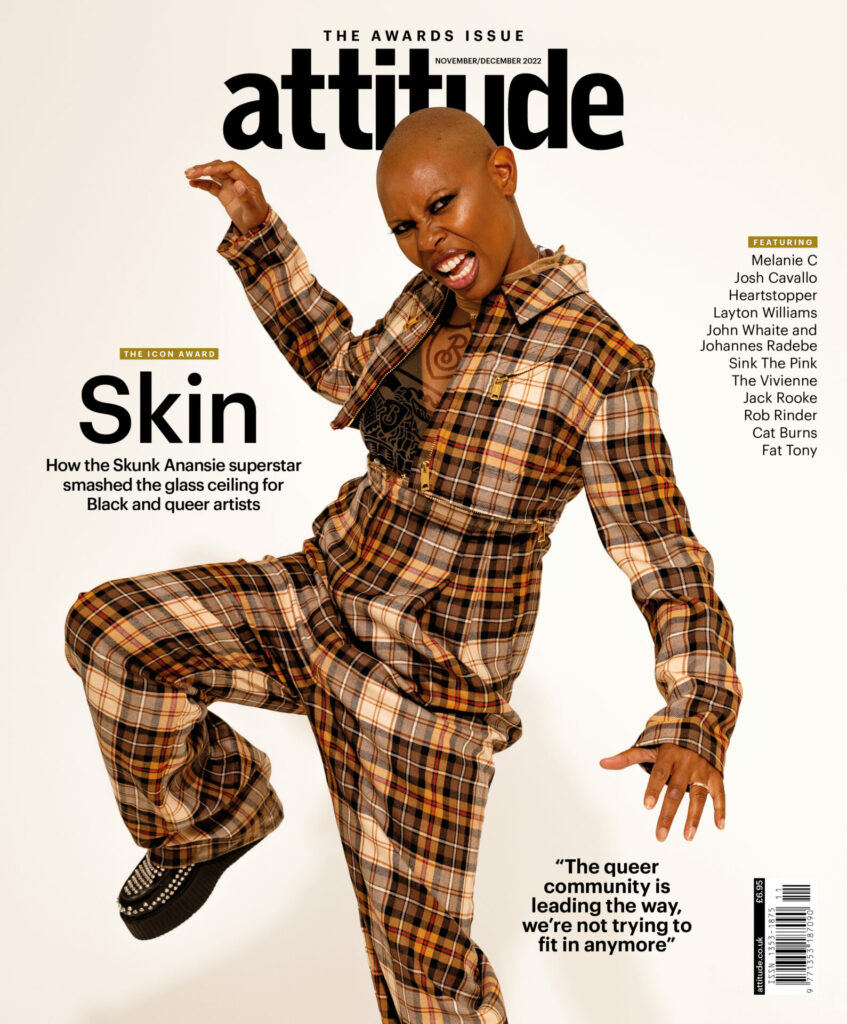
Deborah Anne Dyer aka Skin found fame as the feisty frontwoman of Skunk Anansie, a band which, despite an eight-year hiatus (they formed in 1994, split in 2001, and reunited in 2009) released six albums that sold more than four million copies worldwide. Career highlights have included delivering a blistering performance alongside Björk for the debut of ‘Army of Me’ on Top of the Pops in 1995, and touring with the likes of David Bowie (several times), U2, and Lenny Kravitz. Another high point was closing the 20th century as the first Black female to headline Glastonbury when Skunk Anansie played the Pyramid stage.
Reflecting on this moment, she says, “You could debate that Maxim from the Prodigy was the first ever Black artist to headline back in 1997, but I was the first Black female. In that respect, all over Europe, I was the first Black woman to be on that stage at every festival we headlined. Sometimes Cass [who plays guitar and bass] and I were the only Black people on the bill! Nowadays, you can shout that from the hilltops, but back in the day, it was something you didn’t talk or make a fuss about. Even now, it took almost 20 years for the next Black [British] artist after me — Stormzy — to headline Glastonbury.”
Skin’s influence has been far-reaching. She has kicked down doors in the music industry and refused to play by the rules or to conform to stereotypes so that we — the wonderfully weird, unapologetically unique, queer people of colour females from all walks of life — wouldn’t have to. When I ask the 55-year-old how she feels when she looks back on her legacy as a crucial role model for generations of Black, queer and female musicians, Skin doesn’t hold back.
“It’s lovely to hear, but I don’t think about it like that. I don’t look at myself or the band that way. I realise there are bands influenced by Skunk Anansie, like Nova Twins or Willow — who looks like my daughter most of the time — and I’m so happy about that. I’m so excited about the number of Black artists collaborating with major rock bands now who might have been told by their label it was a bad idea in the past or only done so as a favour.”
Music and a fierce rock spirit coursed through Skin’s veins from an early age. “I divided my time between church and music. I grew up surrounded by warm, hardworking folks who’d arrived in Britain as part of the Windrush generation to work the jobs that English people didn’t want to do for half the price and more or less [to] be re-enslaved,” she tells me.
“Jamaican families play music nonstop, so I heard it in the womb. But I got into music because of my grandad’s club. We lived in a two-up and two-down in Brixton, and my grandfather had a very well-known nightclub in the basement with a separate entrance. I used to sit on the top of the stairs until it got too late, watching people dancing and enjoying music. I was very enthralled by it.”
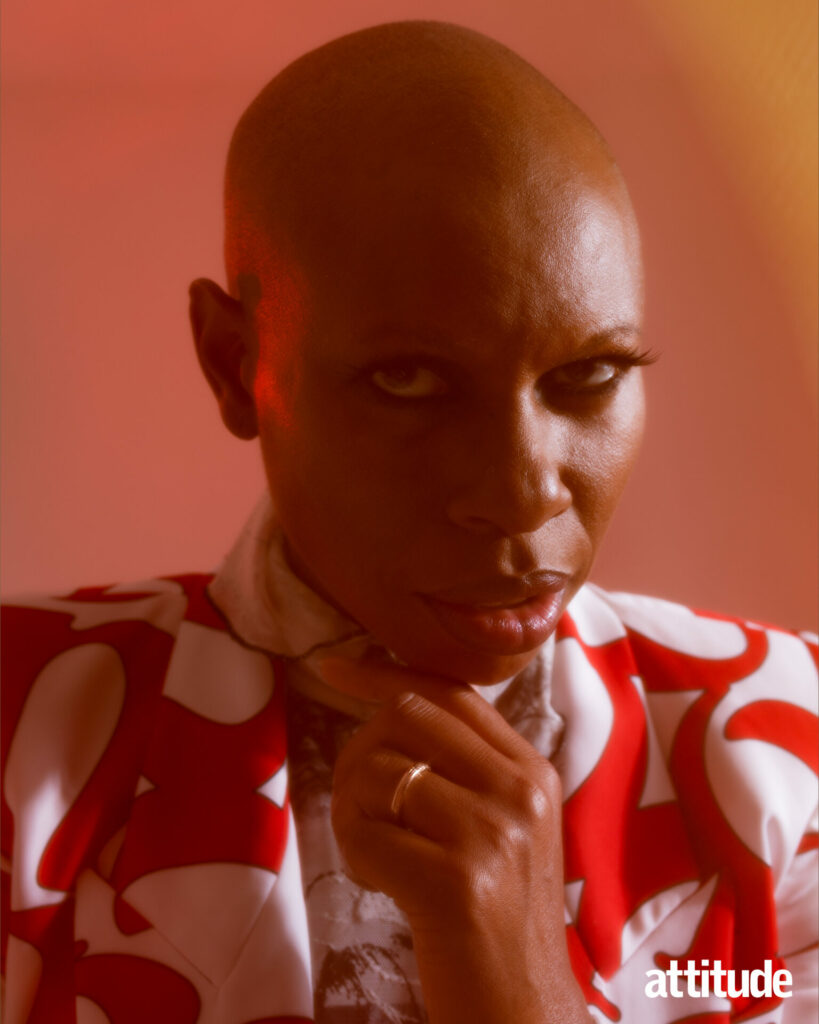
At school, Skin struggled to fit in. She was a tomboy, super skinny, and with hair that wouldn’t grow. But at home, she put pen to paper and expressed herself through poetry and songs without ever singing them out loud. “In many ways, you could say the writing came before the voice,” she reflects. “I knew I could sing at six years old. I hadn’t actually sung, but knew I could, and my musical brain knew when something was out of tune. So, a little arrogant me was there judging everyone on their musical prowess. Finally, [at] around eight years old, I started writing songs, and by the time I got to 12, I had about 24. Someone gave me a Filofax for my birthday, and I kept them folded neatly in there.”
Skin never told anyone about the songs. But inside the shy church girl was a raging rock star yearning to break free. “As a teenager I had a recurring dream, night after night, where I was standing on stage, singing full force, at the top of my lungs into a microphone in front of a sea of fans. That dream became the barometer of how I saw myself on stage and who I truly was and wanted to be. On the outside, I felt like a facade, but on the inside, this is who I was. It was almost like my conscience telling me to let her out, set her free. I knew that was the direction I needed to go in.”
Skin enrolled at the London College of Furniture and soon began to create her own identity. “In two weeks, I completely changed my look. I became a goth at college. I started DJing at 17 and used to play everything from The Cure to Public Enemy. I loved The Specials, Pauline Black of The Selecter.”
In the late 80s, Skin moved to Middlesbrough to study at Teesside Polytechnic. There she discovered the city’s gay scene and explored political activism at the student union. She also had a brief stint in a cover band. “I sang Prince covers, Talking Heads covers, and indie rock. That’s when I got the singing and the performance bug. It was terrifying, I was nervous as hell, and I had a lot of stage fright, but something about it got me hooked.”
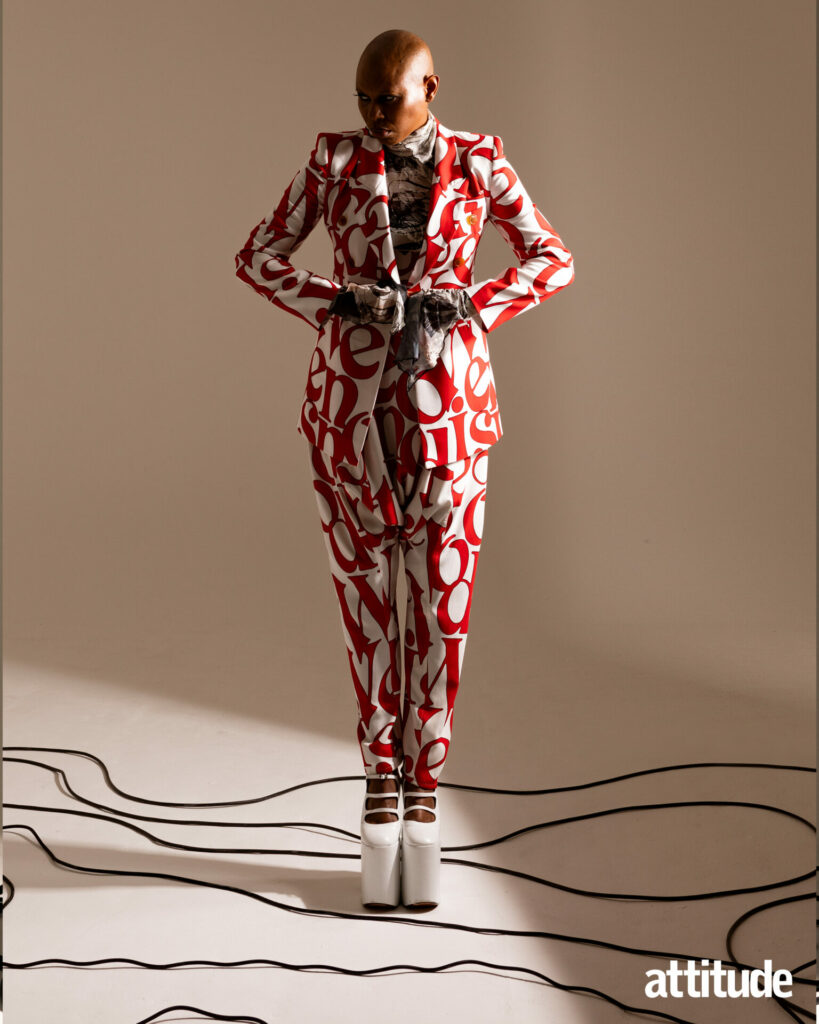
While finishing off her degree, Skin spent her summers in Brixton. She formed her own club night for queer people of colour, which paved the way for similar events in the community, and also worked as a bouncer at The Fridge when they held their Venus Rising event, which was one of the first for women only.
One night, on her way home from Venus Rising, Skin was attacked and sexually assaulted. In an email following our interview, she explains that after a failed prosecution, her attacker turned into her stalker. Until one day, when the man approached Skin on the street and whispered, “I know where you live.” Suddenly, the fearless girl from her dream took over and Skin unleashed an unstoppable fury until the man took flight.
Having ruminated on the incident in the intervening years, she has recognised that this part of her character had remained hidden until then and that tapping into it became a tool she would later use on stage. “The way I was in that moment was how I’d always imagined myself performing, and that incident taught me how,” she told the Observer in 2020.
Once she had graduated, Skin moved back to London and started making inroads into the underground music scene. “I said yes to lots of stuff, but I just kept being asked to go in jazz bands because I was a Black girl and tall and skinny. I love jazz, but I’m not a jazz singer….” Skin croons the lush opening bars of ‘Autumn Leaves’ for me, giving them a sultry, husky twist, then starts giggling. “You can hear that it was all right, but it wasn’t me. My lovely clear voice, I sound like John Legend!”
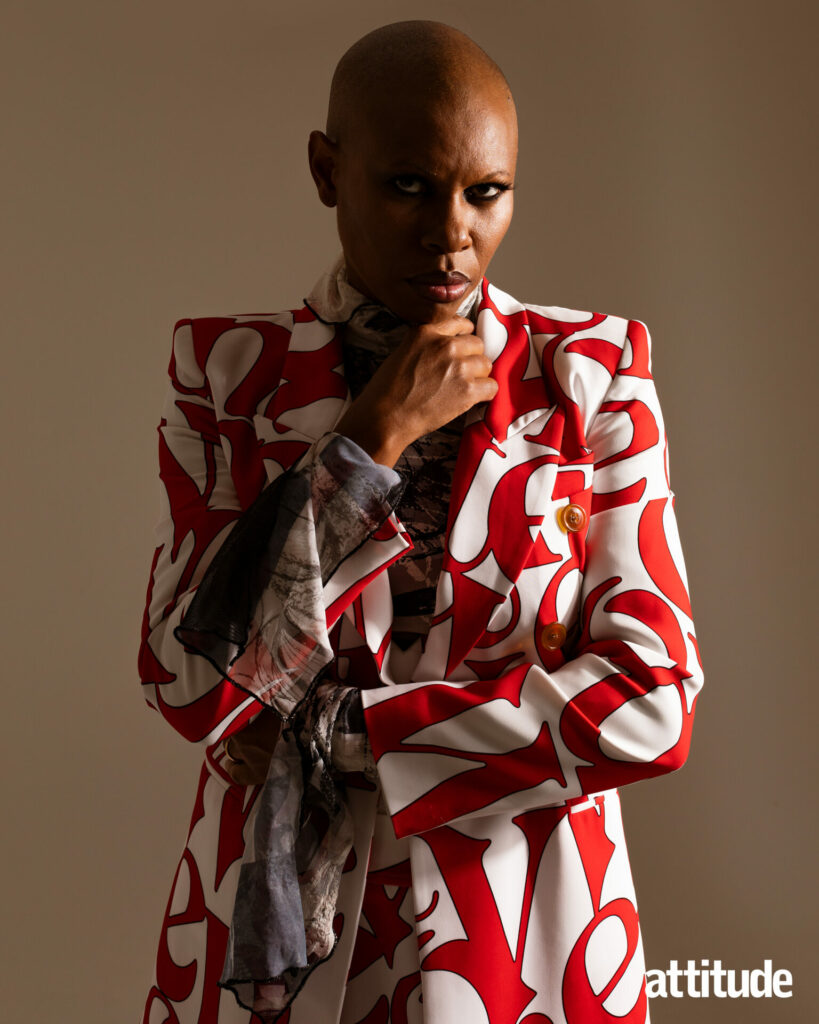
Eventually, she found her “tribe” in pubs around Camden and Kings Cross and divided her time between gigging seven nights a week and working full-time as an interior design assistant. “Back in those days, you had to get up off your ass and go out if you wanted to be part of the scene, the creative community, and subculture. If you wanted to be ‘in the room’, that’s how you got in, by meeting people who could say, ‘Oh, Skin’s a singer; you should get her in your group.’”
As such, Skin started hanging out at The Splash Club, where all the unsigned rock acts played, and eventually started her own, blues-driven band, Mama Wild. This was a period of experimentation, which included establishing her own image.
“At the beginning of my career, I was like a ball in a pinball machine. I was shooting around in all directions, trying to find out what would work to ring the bell. There was so much trial and error, all the leathers, and skinny jeans and trying to look like a white boy rocker,” Skin explains. “I was Black, female, gay, and had a shaved head — androgynous, not super femme. I wasn’t butch or a lipstick lesbian during a time when you were pressured to pick one.
“I discovered rock music in my late teens, I hadn’t been listening to it from when I was two years old like the other white rock bands had. Then it struck me that the thing I was running away from was what would save me from being like anyone else and make me stand out. After that, I stopped wearing the rock’n’roll uniform, didn’t get tattoos, got a couple of piercings, and everything just fell into place. I realised my originality was my best asset and have kept it that way since. There’s only one Skin. There’s only one Grace Jones. There’s only one Tina Turner. There’s only one Diana Ross. We’re all 100 percent different from each other, and that’s the biggest lesson I learned.”
Mama Wild was a good band, but Skin knew the best unsigned musicians who would make a better one. In 1994, Skunk Anansie was born, and Britrock would never be the same. “We were onto something within the first 30 seconds of the rehearsal. We all felt it. The chemistry was there, and we just fell into a sound, and it was … ‘WOW!’” Skin proudly beams. “We knew we had something magical and were absolutely amazing, and I’m not saying that to sound arrogant, but we had to be. When you have a Black girl lead singer and a diverse band, you have to be 10 times better than everybody else. You have to blow people’s socks off to get to the same levels as an average white boy band.”
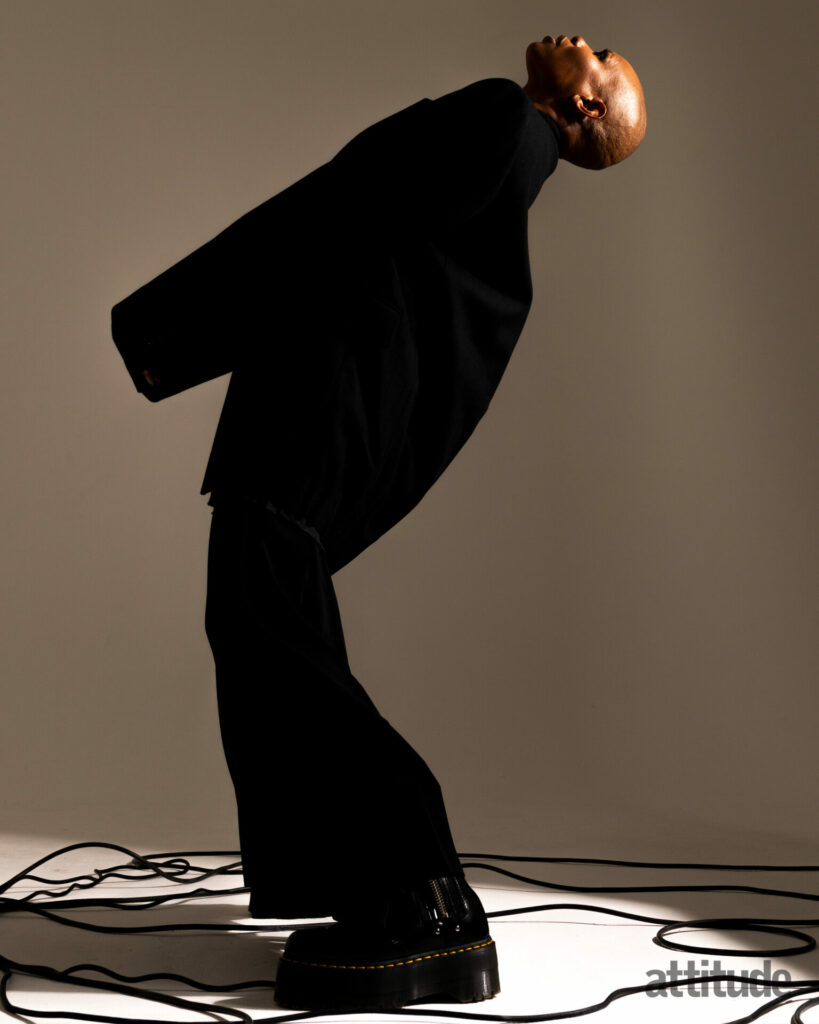
Skunk Anansie played their first gig at The Splash Club to a packed-out room of mates and their second gig to an assembly of industry heavyweights, including an A&R from One Little Indian (now One Little Independent). “It was the day Kurt Cobain committed suicide, and he was a big Nirvana fan. He said, ‘I went to your gig and forgot about Kurt Cobain dying, and that’s when I realised you must be good.’ That same A&R came to our third gig to double-check, and that’s how we got signed.”
Skunk Anansie have been ferociously unapologetic and upfront about their sonic, visual, and live aesthetic since the day they formed. At every turn, they’ve flexed their disinterest in playing by industry rules or conforming to societal norms. All the while, Skin was forthright and fearlessly open about her sexuality.
“I didn’t feel brave; I just didn’t care. Many people didn’t realise that when we signed our first record deal, I was 26 years old. I was a grown-ass woman. I’d heard all the crap about my appearance. I’d been through all the negativity about my sexuality. I got into the gay community, found my family and friends, and worked it out. In the early 90s, it was like, ‘You can be gay, just don’t put it in our face, you’ve got to fit in,’ and I was never about that.
“When I came out, the gay community was still like, ‘Hey, don’t worry, gay people are OK. Don’t be scared.’ Now, in 2022, it’s like, ‘Girl, if you don’t accept me, then go change yourself!’ We have such a different attitude towards gender politics today. We’re not trying to fit in any more. Instead, the queer community is leading the way now to how people should feel comfortable and secure with themselves. Everyone is watching us and saying, ‘This is how you do it? We want to be like them.’”
Skunk Anansie — whose name derived from Anansi, the spider of Ghana folklore, with ‘skunk’ added to “make the name nastier” — originated a genre of “cock-rock” Skin coined as “clit-rock”, meaning a blend of “heavy metal and Black feminist rage”. This saw them maintain clout on the underground circuit as well as use their sweat-soaked, raucous live gigs to gain traction with the mainstream masses.
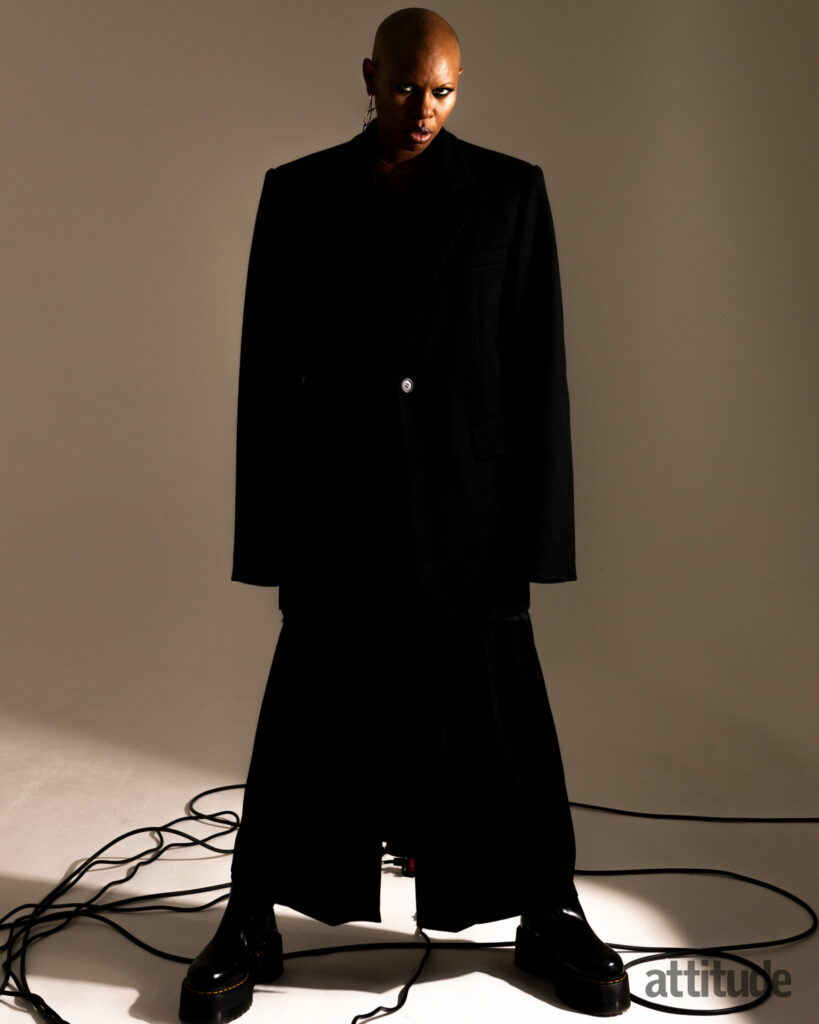
Their early singles stirred controversy across the airwaves. First up was the anti-fascist anthem ‘Little Baby Swastikkka’, then ‘Selling Jesus’, a takedown of religion and capitalism, and the hard-hitting ‘Yes, It’s Fucking Political’.
“I never saw those songs as controversial,” Skin comments. “Those songs were just talking about our experience being a diverse band. When people of colour talk about their lives, suddenly, it’s controversial. I’m just talking about my life. Being a Black gay woman might be controversial to them, but it’s not to me. It’s my story. A white guy talks about his story, and everyone goes, ‘Oh, that’s amazing, it’s amazing!’ But if I talk about it, it was a bit risqué. In some ways, that becomes the ‘establishment’s’ chance to put you in a box and throw away the key.”
The band’s authentic approach paid off, with Skunk Anansie voted Kerrang!’s Best British Live Act in 1996, while in 1997, they were nominated for Best Live Act and Best Rock Act at the MTV Europe Music Awards. They broke up for a brief period while Skin found fame as a solo artist, only to reform and, by 2004, be named as one of the most successful UK chart acts by the Guinness Book of British Hit Singles & Albums, with a total of 142 weeks on both the singles and album charts.
Does Skin feel Skunk Anansie got the recognition they deserved? “Oh, hell no! I think the ‘establishment’ in England still has a long way to go. Yes, they gave me an OBE. Now they want Black people and women to be the face of everything, but they still don’t wanna pay us equally. The music industry has never been making more money or in demand, but people are cutting corners on quality for quantity and to save some money while we’re all the most broke we’ve ever been! They are happy for Black people to be the face of everything, but if they showed you all the CEOs and the main people running this show, trust me, they’re white men.”
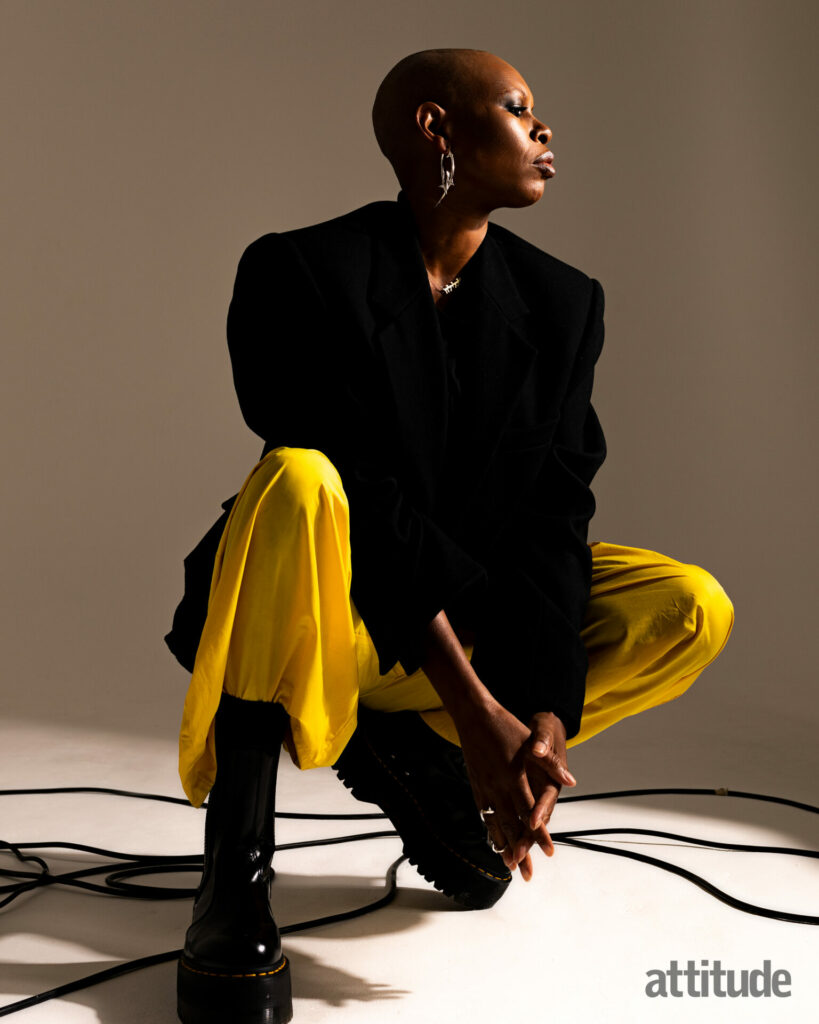
Having sent such bold, powerful messages within and beyond her music, Skin thinks every artist has a responsibility to continue to amplify that. “Some people just write party songs because that’s them. We need those, too. I think it would be horrible if everybody wrote political songs because the music would be one-dimensional. I don’t necessarily want to hear an in-your-face political anthem when I go out clubbing. When I want to have sex, I don’t always want to play Rage Against the Machine. I think that what’s important as an artist is ‘you do you, and I’ll do me.’
“I also recognise that it’s pretty challenging to write a political song. Some people write political songs, and they’re really bad at it. There’s nothing worse than someone doing something they feel they should do, like Thirty Seconds to Mars, and it comes across as disingenuous. A good song has to be authentic. The beauty of music is that there are all kinds of it, coming from everywhere, and everyone should write about their own personal experience. If you wanna write songs about sex, great, I’ll make good use of those songs. If everyone’s writing political songs, then it’s fucking boring, isn’t it?!”
Certainly, a day in Skin’s world is never dull. When she’s not recording The Skin Show or blowing the doors off venues performing live shows with Skunk Anansie, she’s adoring being a mother and spending quality time with her daughter, and getting back behind the decks as an in-demand DJ playing clubs like Pacha.
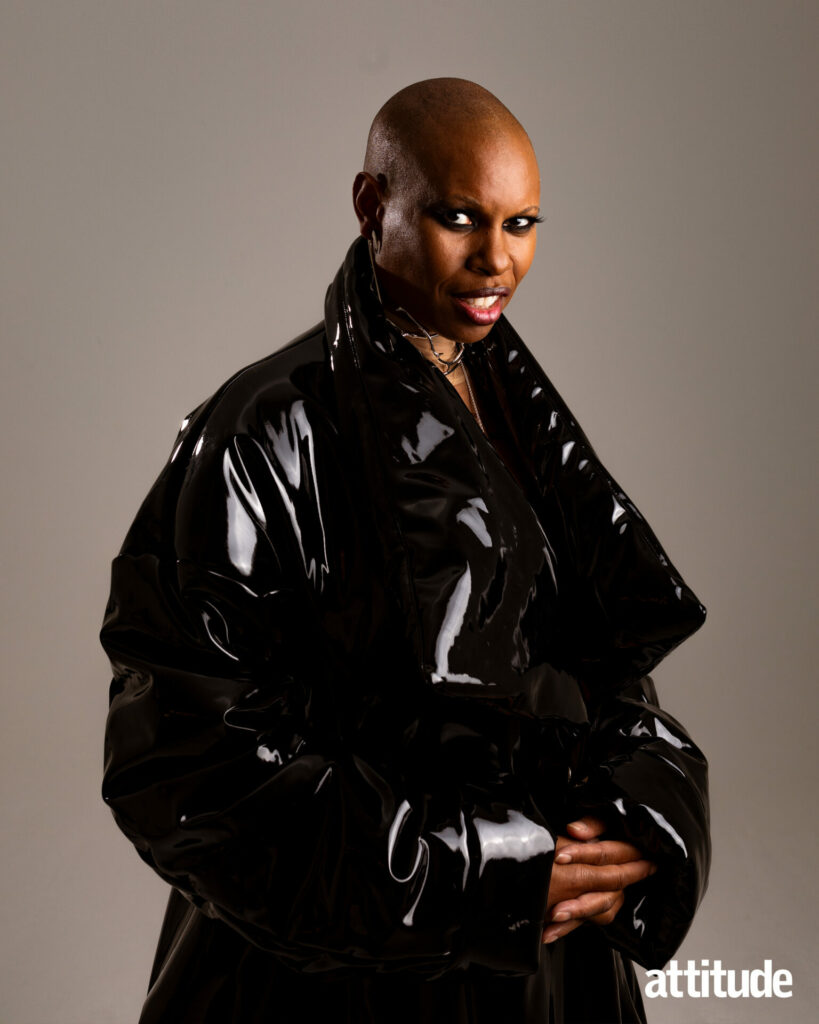
Her proudest achievement among many is that she has found something she loves and can do for the rest of her life. When I ask what the key is to staying in the game, Skin closes with some advice for the next generation. “If you wanna be a rock star, I’d say start now, get yourself a guitar. Don’t worry about growing up because you might never grow up,” she says.
“When people sing these lyrics about ‘loving yourself’, it’s like, ‘How do I do that then, when everybody is telling me I shouldn’t?’ It’s a long hard road to love yourself and be yourself. It takes a long time to be strong enough to be out or to be cool with being an individual that stands out from the rest and not let negativity hurt you. I had to go through a lot of shit to get there. When people say negative shit about me now, I genuinely don’t give a fuck, but that’s because I’m grown. I did when I was 21 years old. It takes a minute before you learn that when people are being hateful, judgmental, or negative, they are uncomfortable with your light, strength and uniqueness because of some other shit that’s happening inside themselves.”
As her daughter starts giggling in the background, Skin’s attention is no longer mine. As she is currently writing music for Skunk Anansie, I finish by asking her what the new album sounds like, and she winks: “It’s going to be very different. But you’ll love it.”
Check out Skin’s acceptance speech from the 2022 Virgin Atlantic Attitude Awards below:
Photography Shenell Kennedy Creative director Joseph Kocharian Styling Sacha Dance Makeup Terry Barber Fashion Assistant Douglas Miller
The Attitude Awards issue is out now
